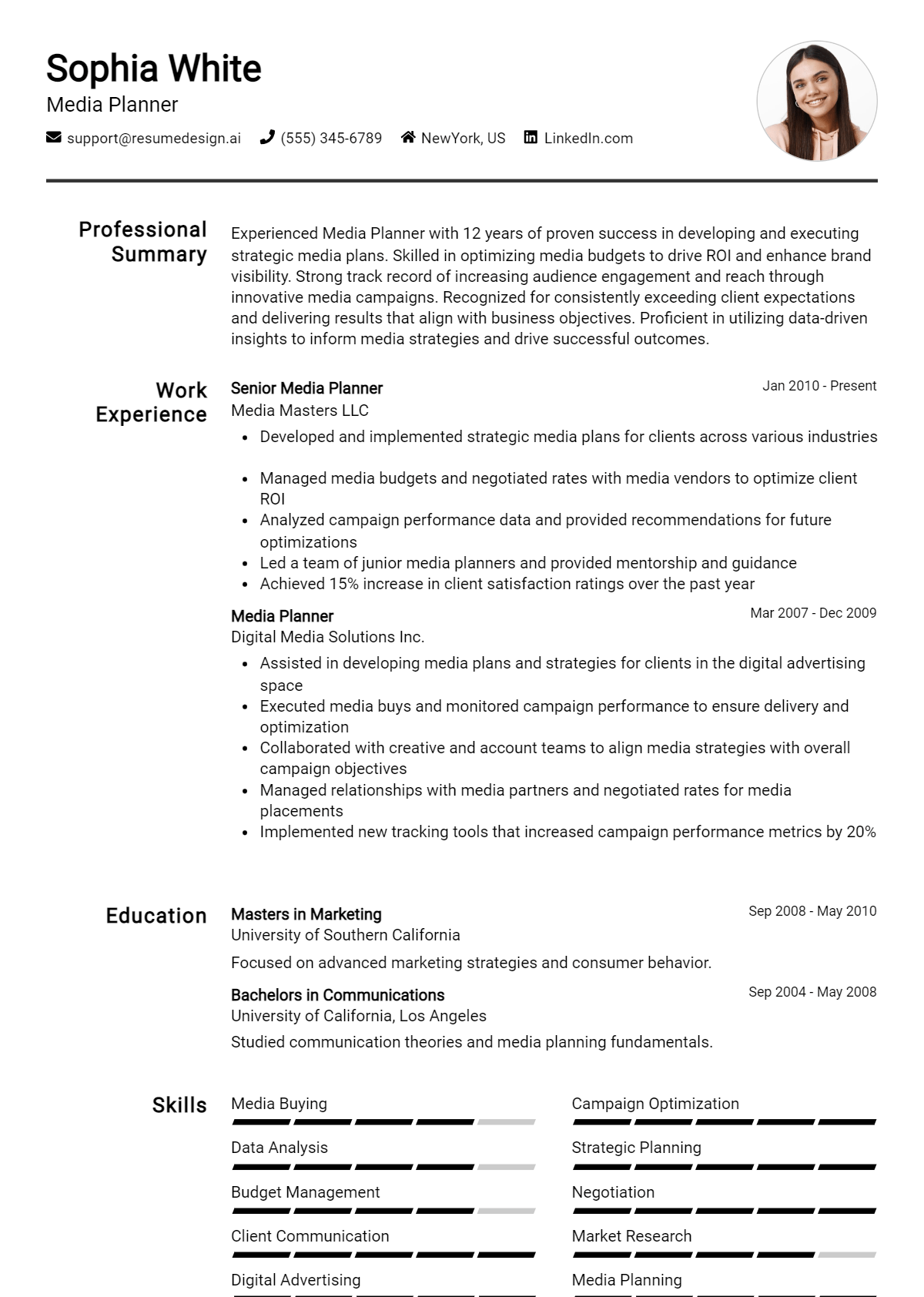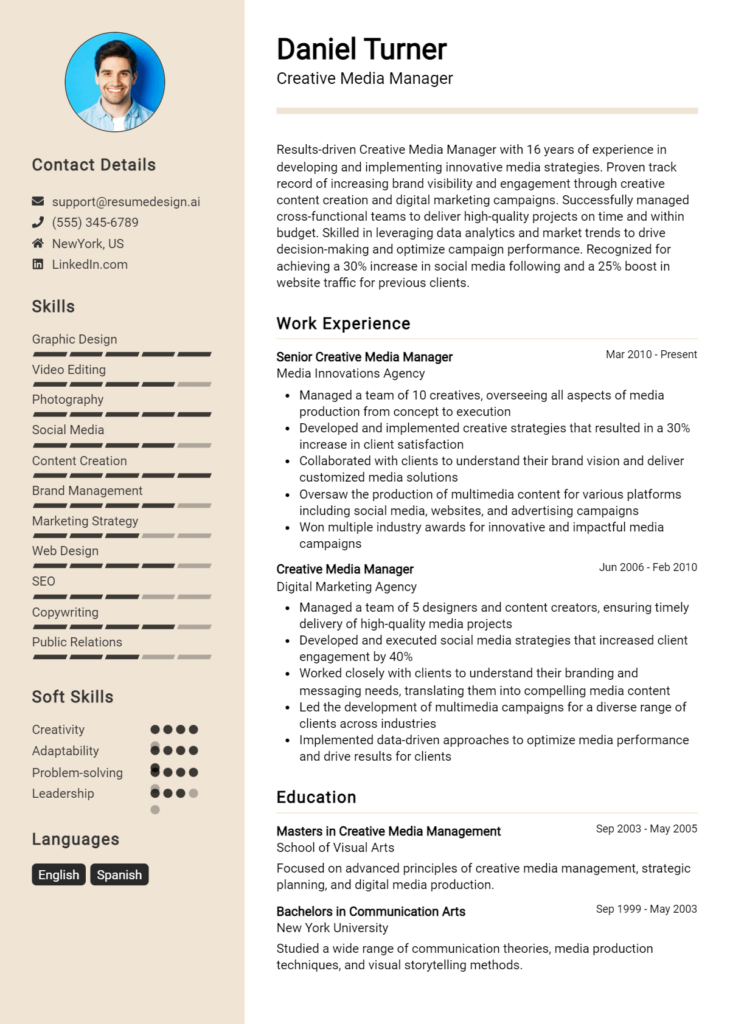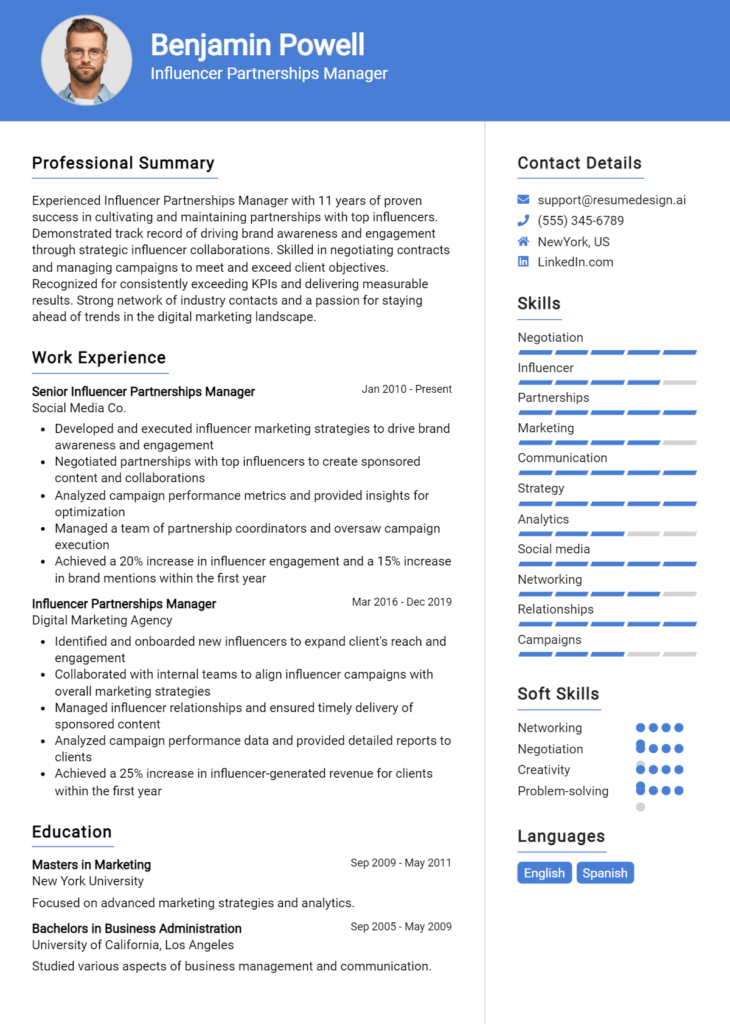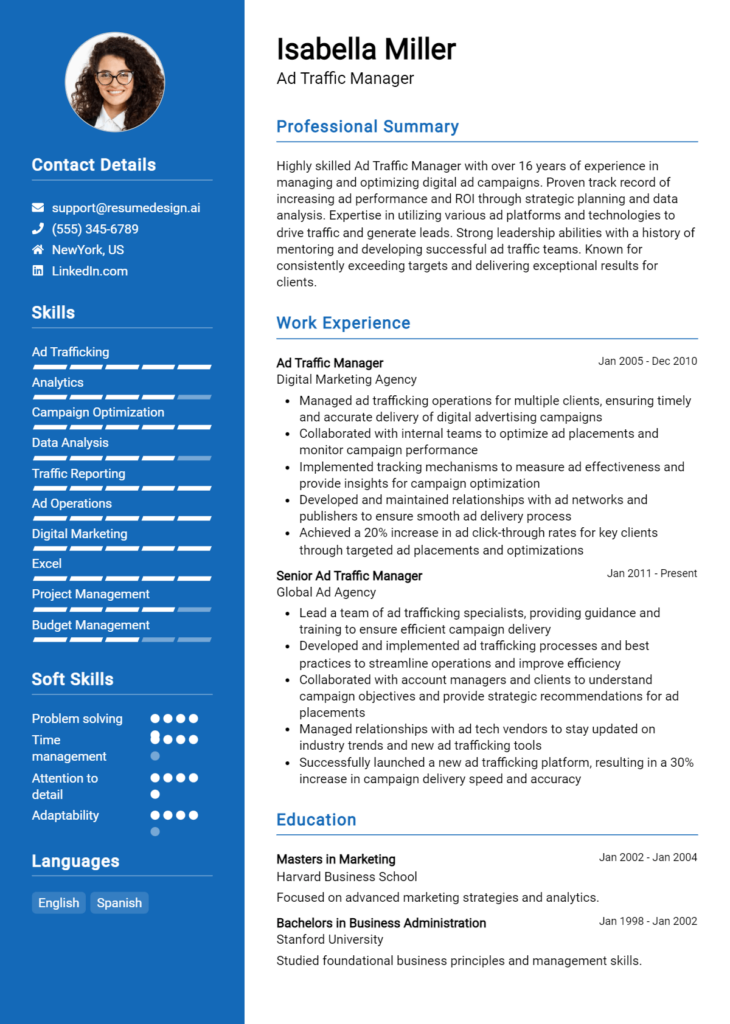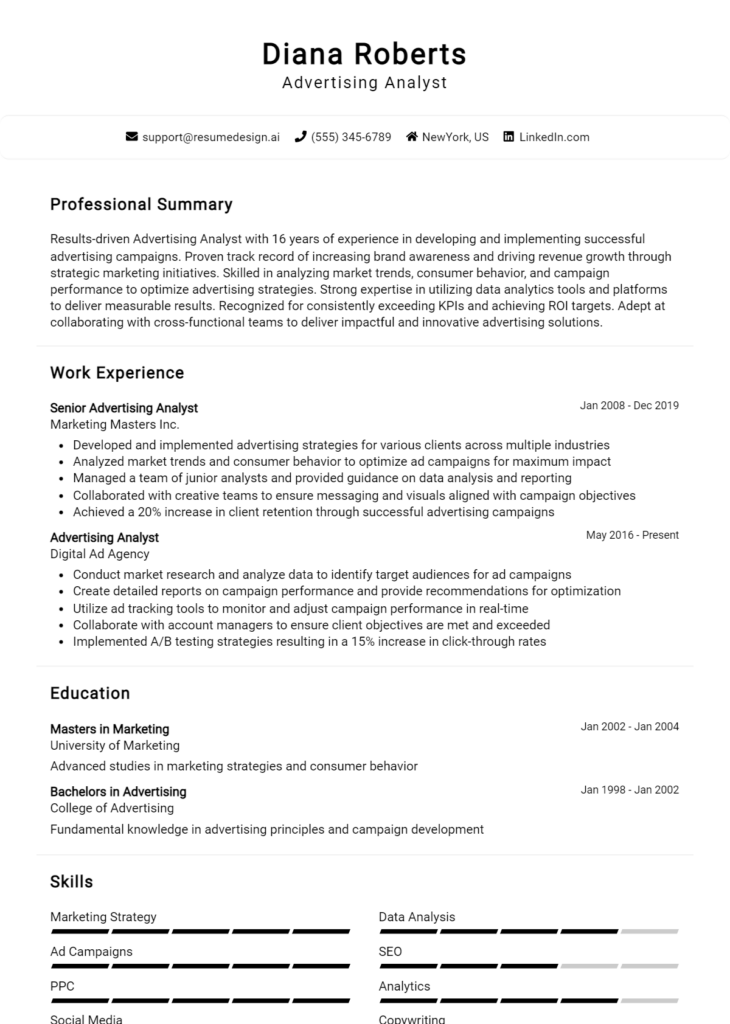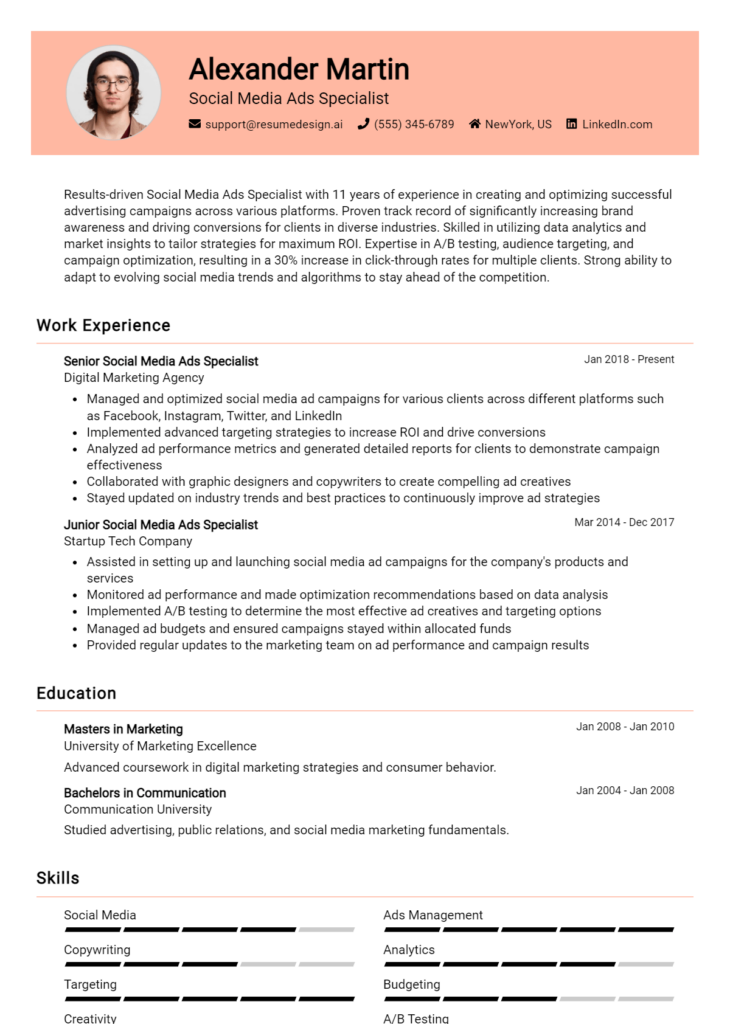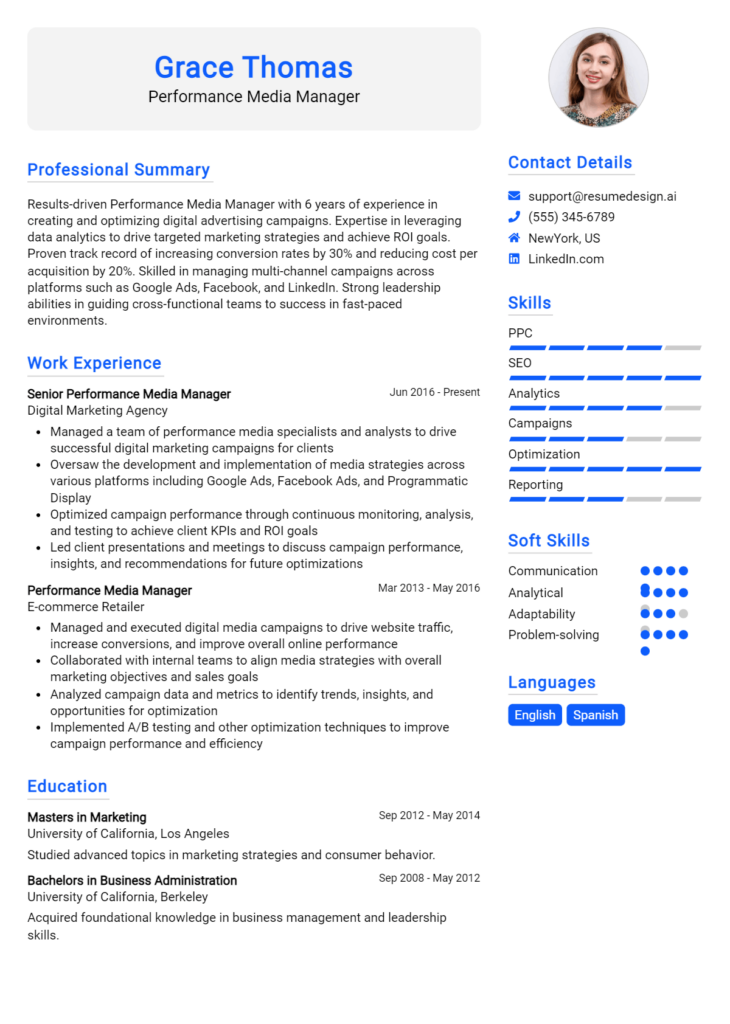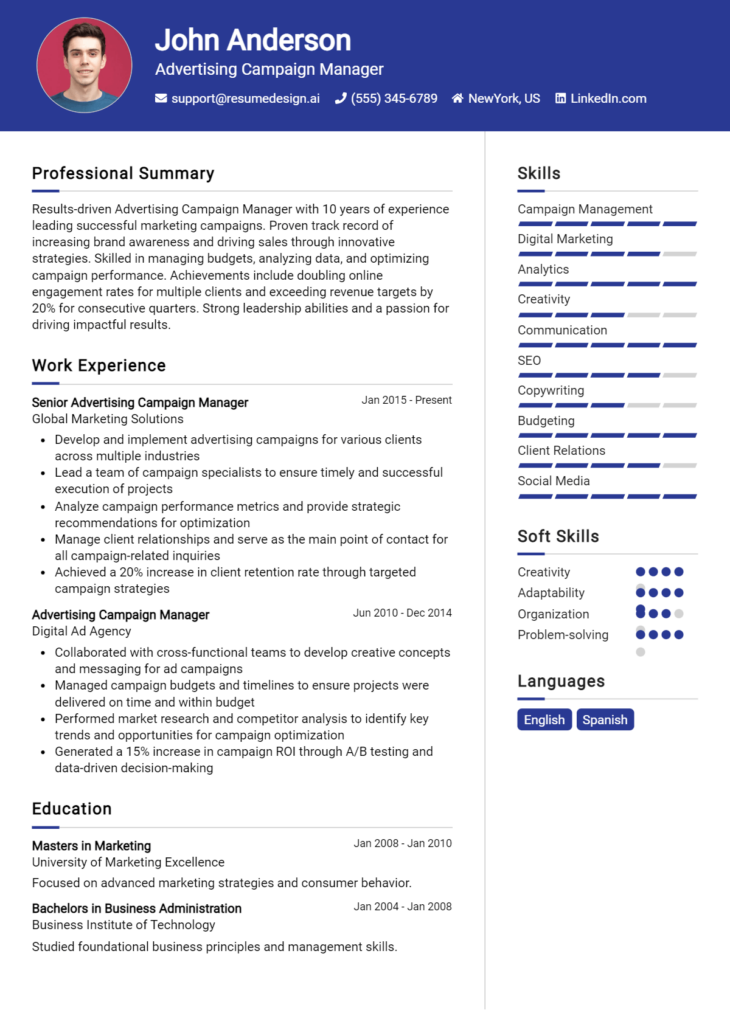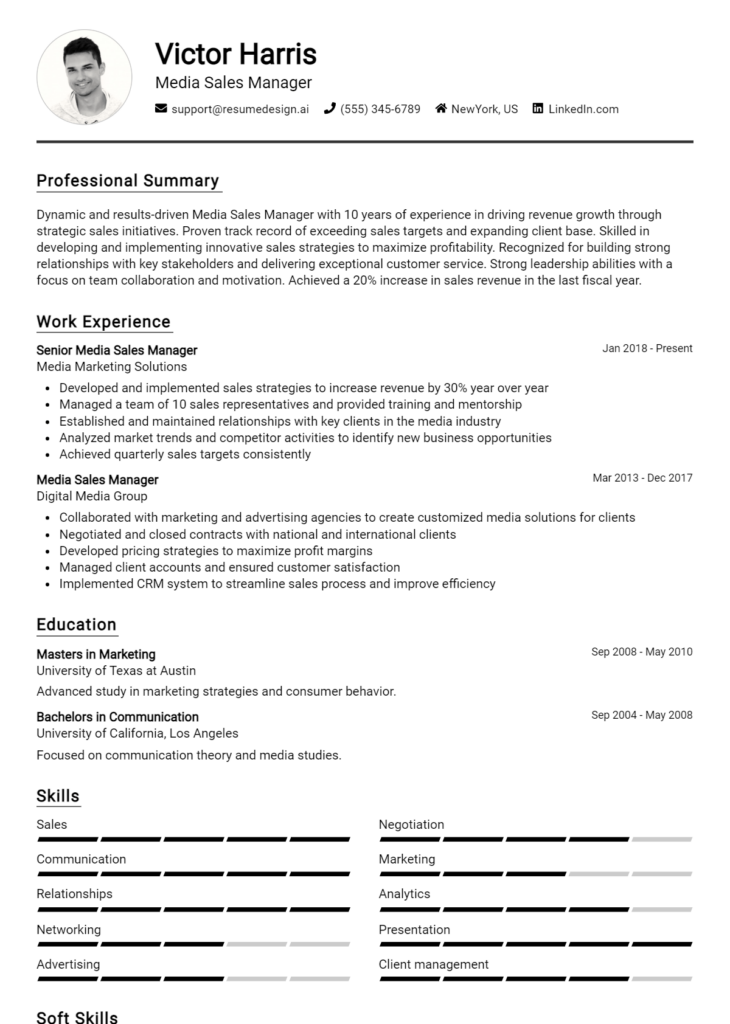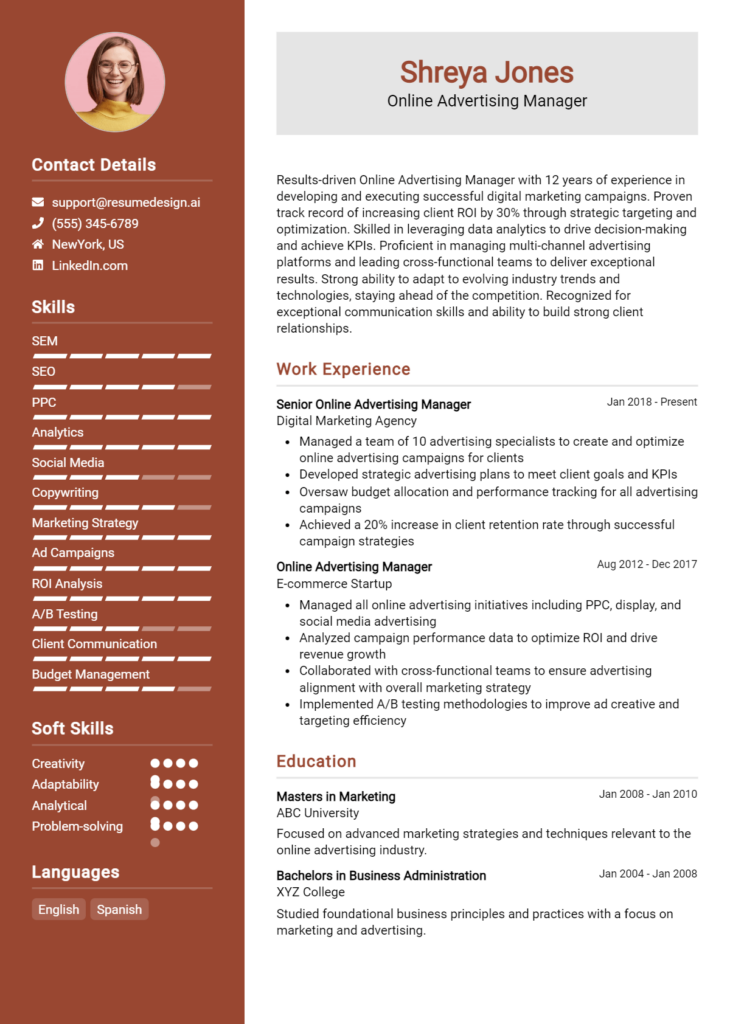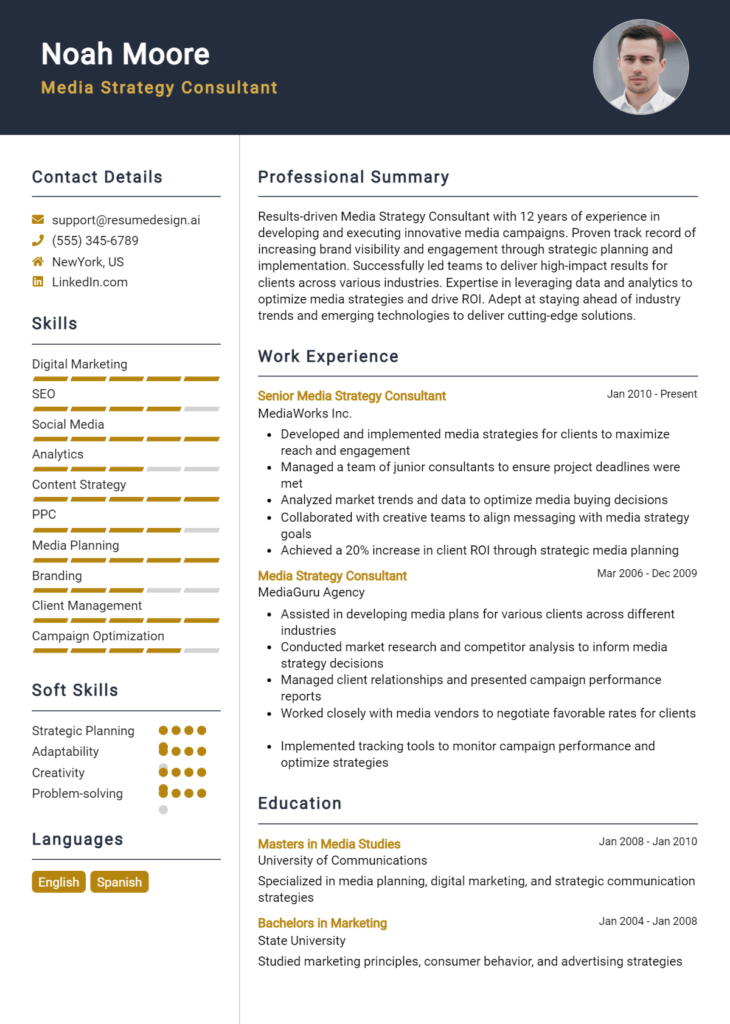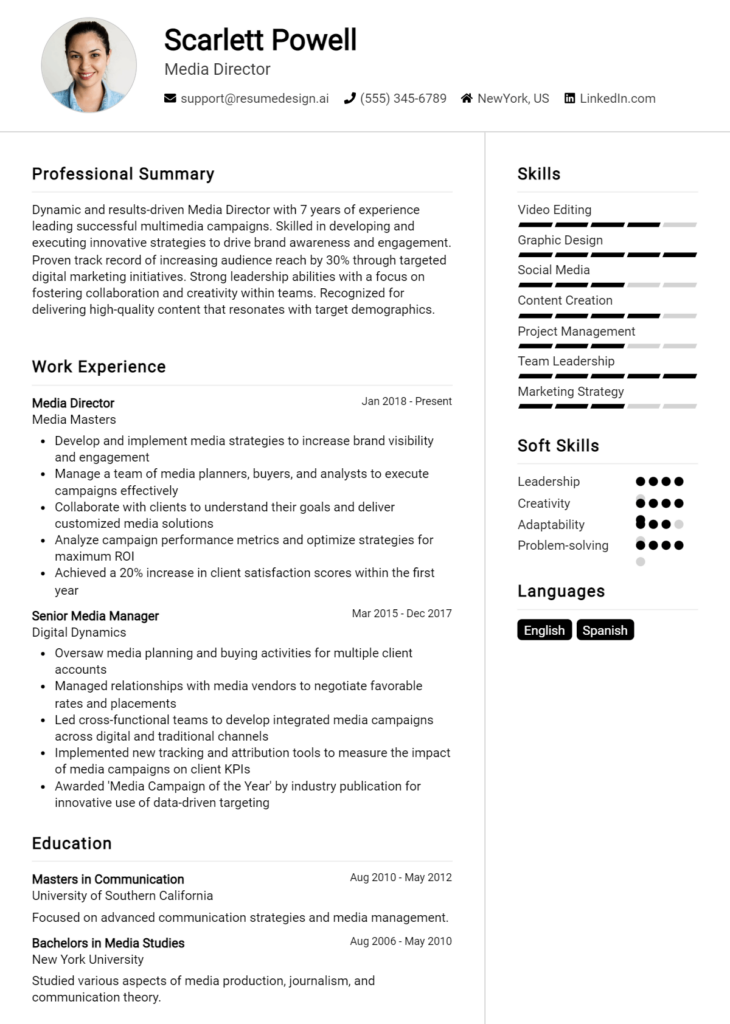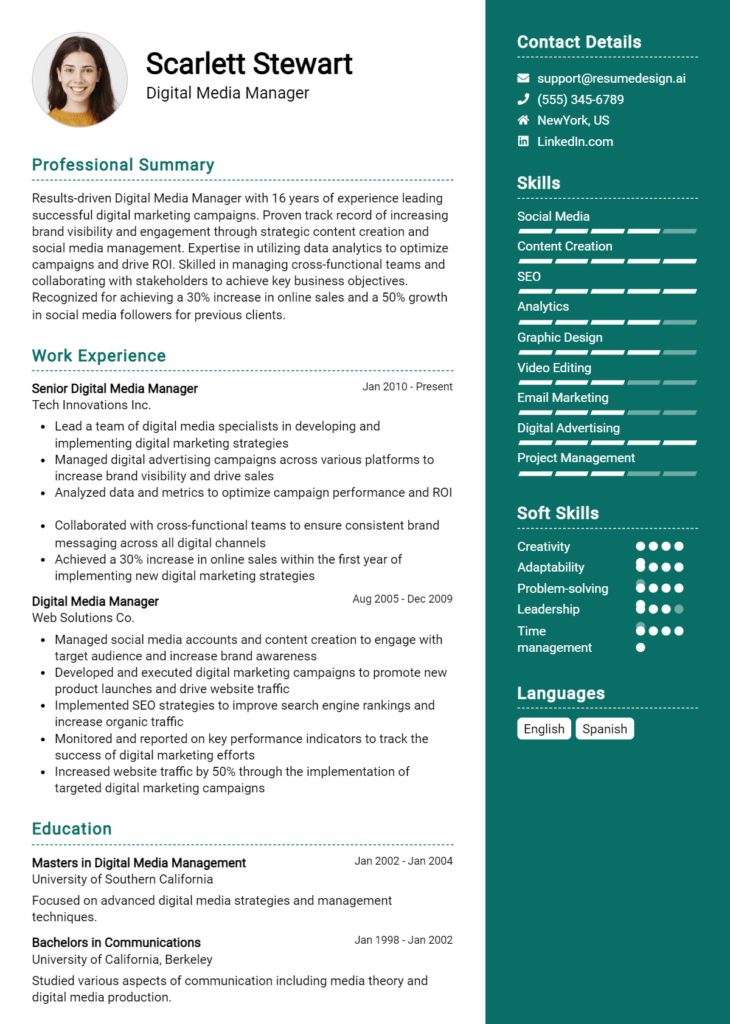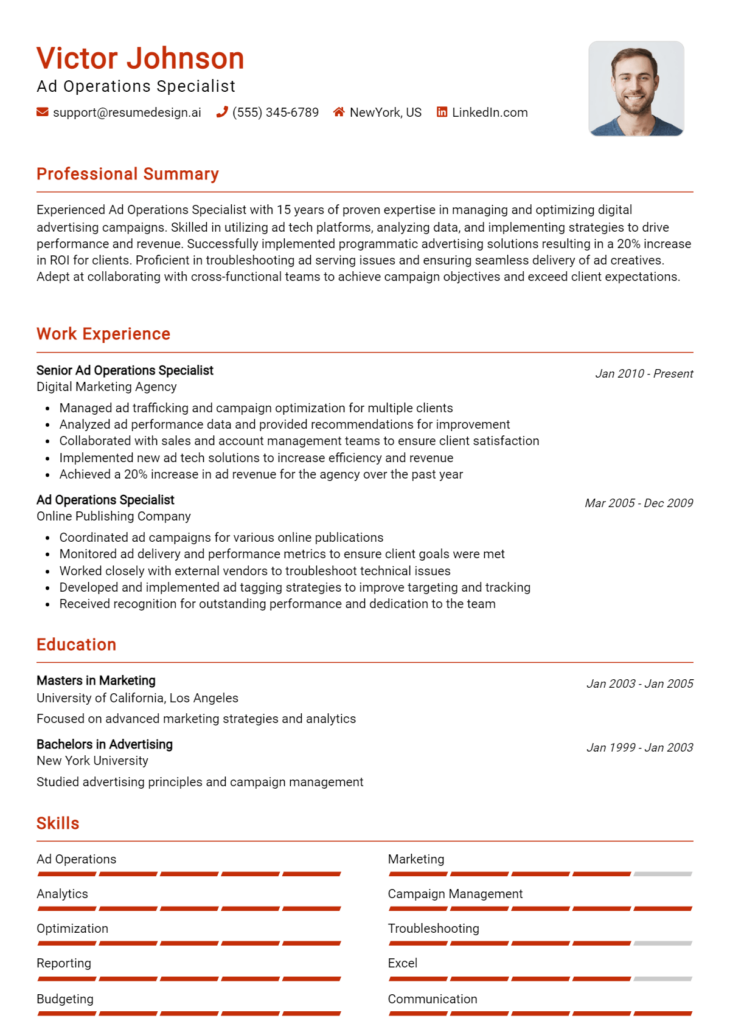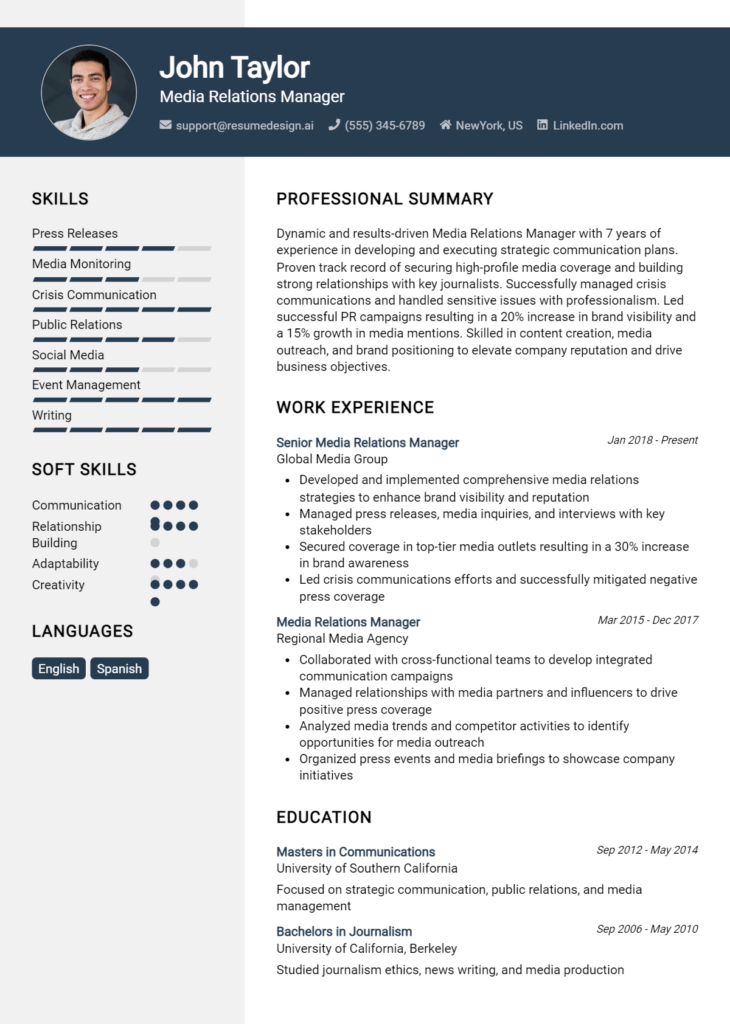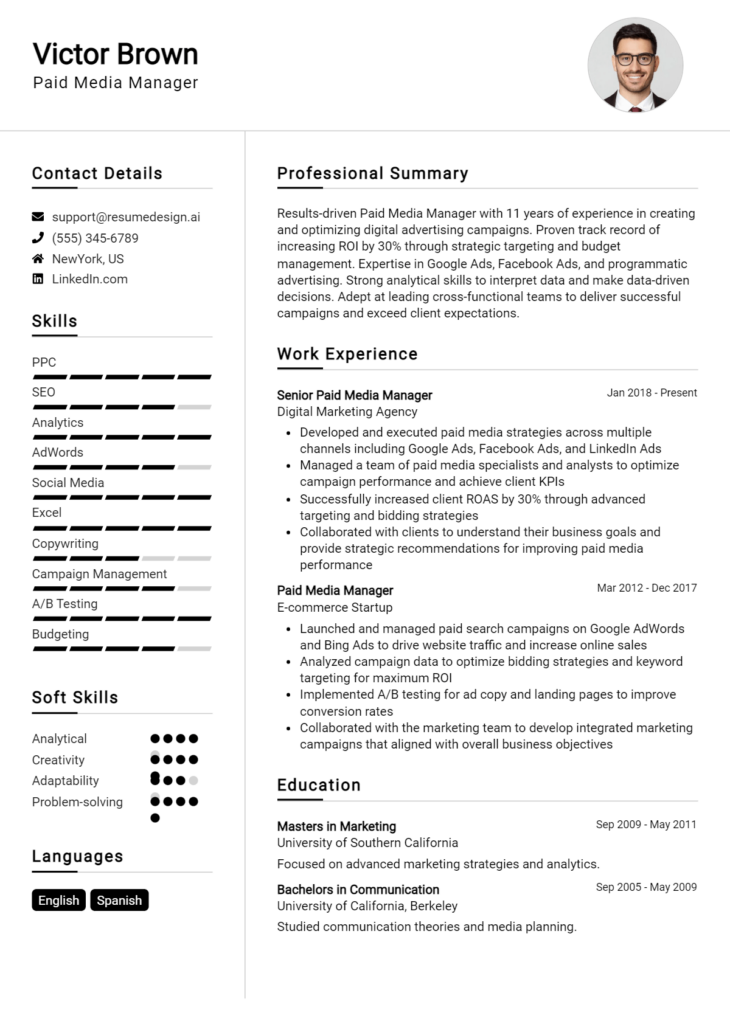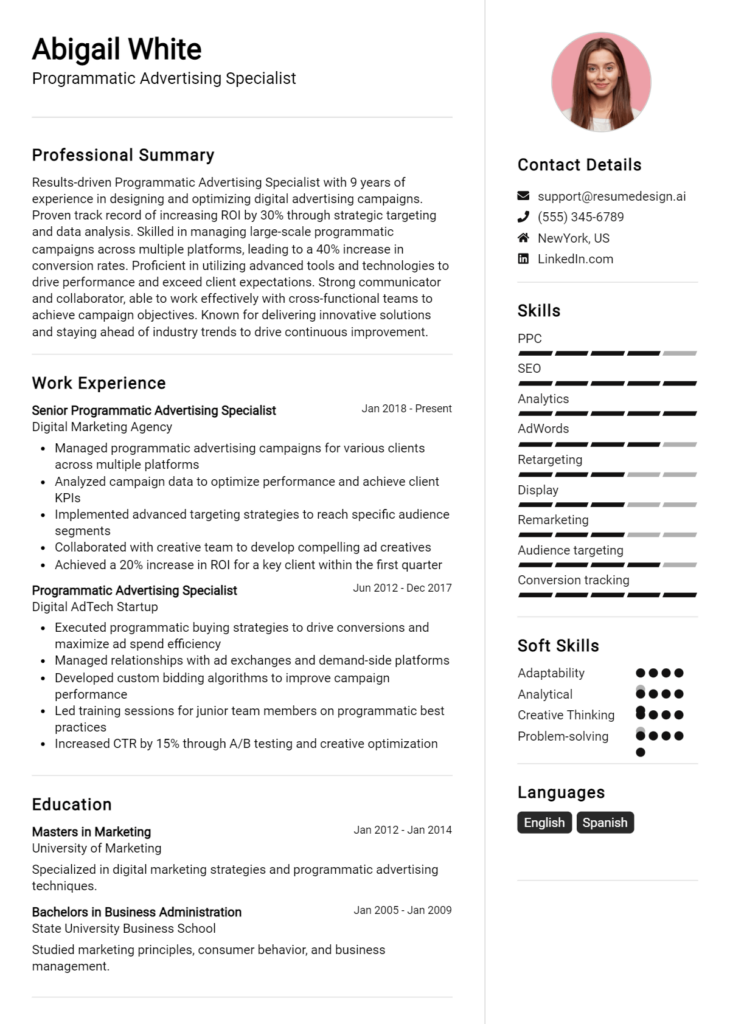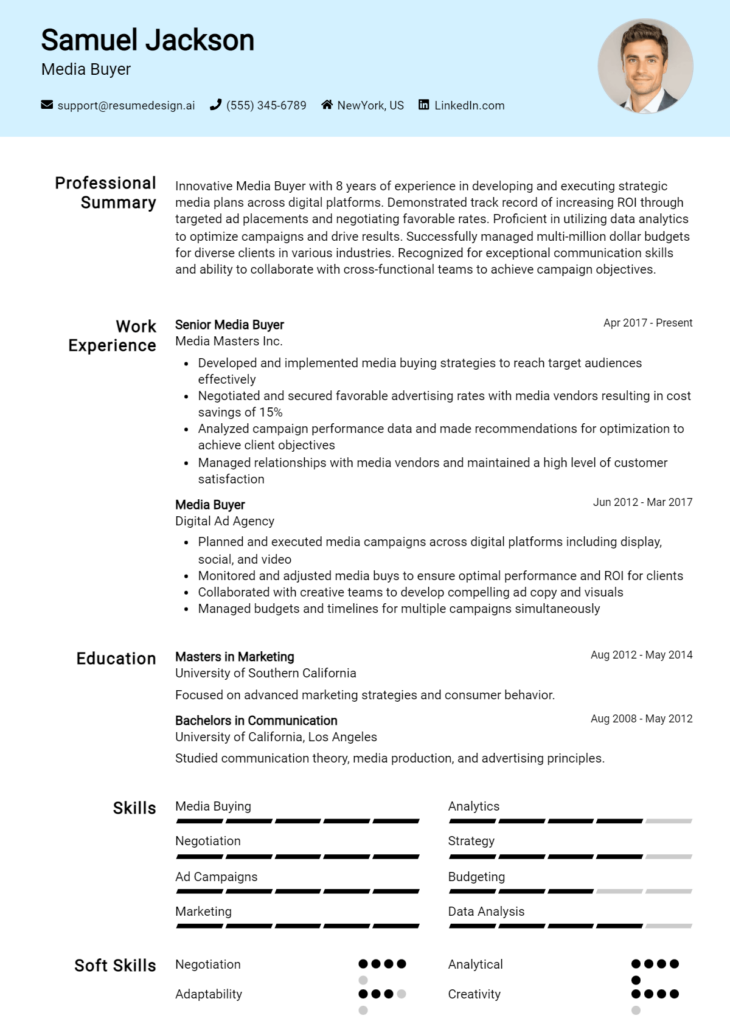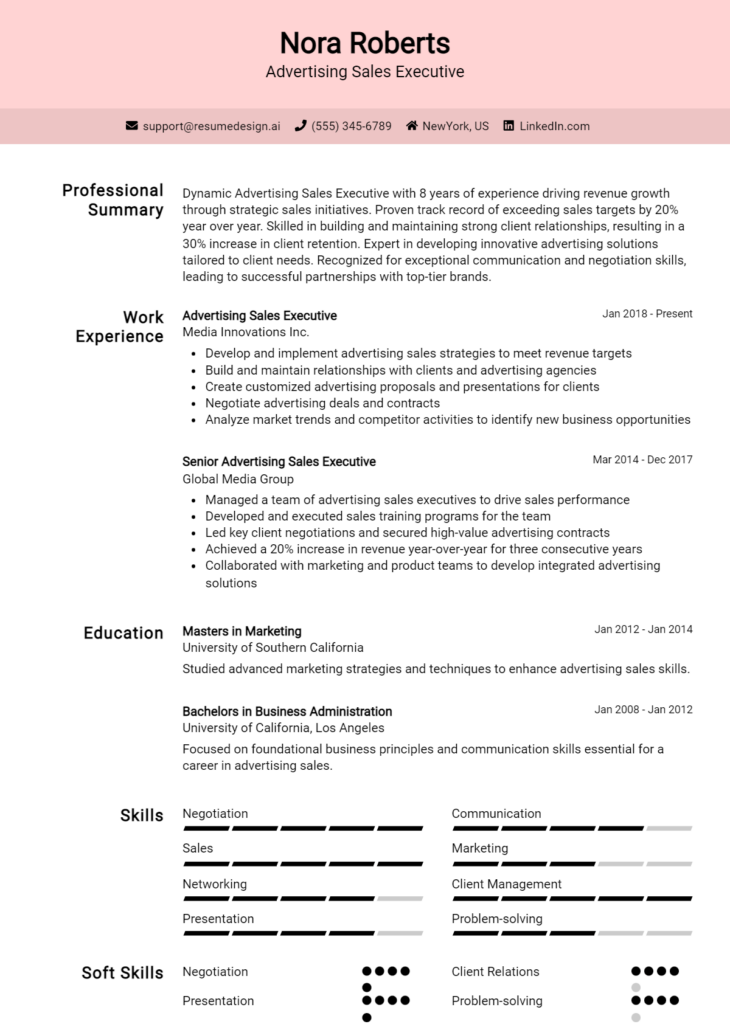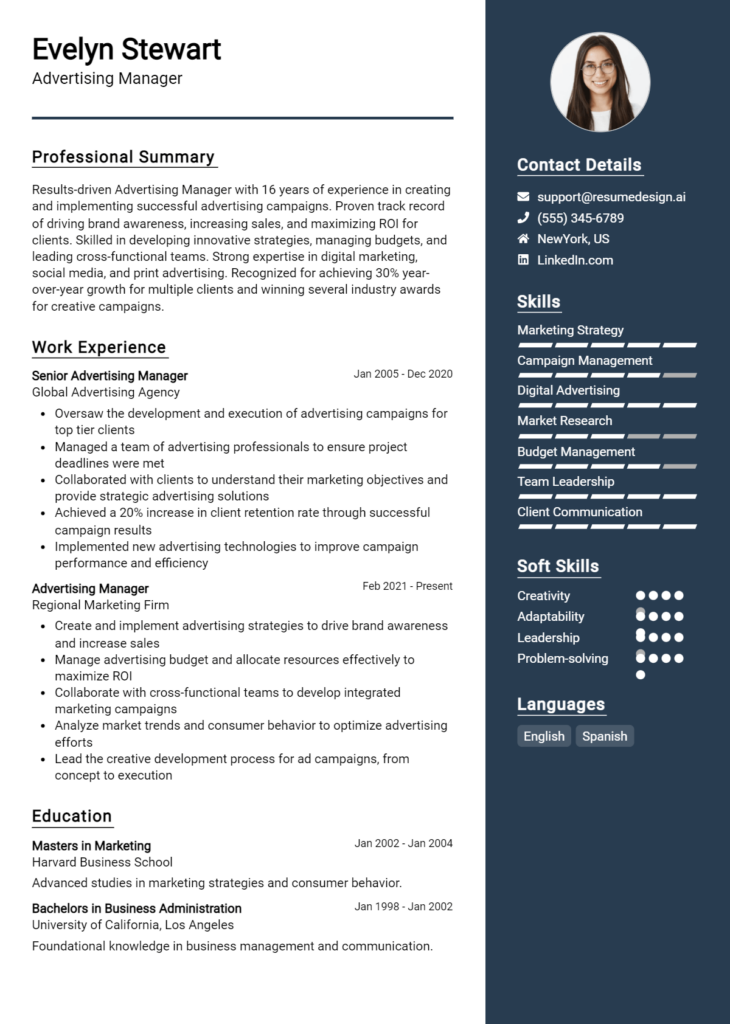Media Planner Core Responsibilities
A Media Planner is pivotal in orchestrating advertising campaigns by analyzing target audiences, selecting appropriate media channels, and optimizing budgets. This role demands strong technical knowledge of media metrics, operational skills for campaign execution, and problem-solving abilities to address challenges that arise. By bridging marketing, creative, and analytics departments, a Media Planner contributes significantly to the organization’s goals. A well-structured resume highlighting these competencies is essential for showcasing a candidate's qualifications effectively.
Common Responsibilities Listed on Media Planner Resume
- Conduct market research to identify target audiences and media trends.
- Develop and implement media strategies to maximize campaign effectiveness.
- Negotiate media buys with vendors to secure optimal placements.
- Analyze campaign performance metrics and adjust strategies accordingly.
- Collaborate with creative teams to ensure alignment on messaging.
- Maintain up-to-date knowledge of industry developments and technologies.
- Prepare detailed reports on media spending and campaign outcomes.
- Manage budgets to ensure cost-efficient media planning.
- Coordinate with cross-functional teams to align campaign objectives.
- Utilize analytics tools to monitor and forecast media performance.
- Build and maintain relationships with media outlets and partners.
- Present media plans and strategies to stakeholders and clients.
High-Level Resume Tips for Media Planner Professionals
A well-crafted resume is essential for Media Planner professionals seeking to make a lasting impression on potential employers. In a competitive job market, your resume serves as the first point of contact, showcasing not only your skills and experiences but also your unique achievements in the media planning field. It must reflect your ability to strategize, analyze, and optimize media campaigns effectively. This guide will provide practical and actionable resume tips specifically tailored for Media Planner professionals, ensuring you present yourself as a top candidate in this dynamic industry.
Top Resume Tips for Media Planner Professionals
- Tailor your resume to the specific job description, aligning your skills and experiences with the requirements of the position.
- Showcase relevant experience by highlighting your roles in previous media planning projects, including specific campaigns you've managed.
- Quantify your achievements by providing metrics that demonstrate the success of your media strategies, such as increased engagement or ROI.
- Highlight industry-specific skills, including familiarity with media buying platforms, analytics tools, and audience measurement techniques.
- Incorporate keywords from the job listing to ensure your resume passes through Applicant Tracking Systems (ATS).
- Use a clean and professional format, making it easy for hiring managers to read and locate key information quickly.
- Include a strong summary statement at the top of your resume that encapsulates your professional identity and career goals.
- List relevant certifications or training that enhance your qualifications, such as digital media certifications or data analysis courses.
- Keep your resume concise, ideally one page, to maintain the reader's attention and highlight the most impactful information.
By implementing these tips, you can significantly increase your chances of landing a job in the Media Planner field. A polished and targeted resume not only showcases your expertise but also demonstrates your commitment to the role, making you a compelling candidate that employers are eager to interview.
Why Resume Headlines & Titles are Important for Media Planner
In the competitive field of media planning, a well-crafted resume headline or title can serve as a powerful tool for job seekers. This brief but impactful phrase acts as a hook that captures the attention of hiring managers, providing a snapshot of a candidate's key qualifications and value. A strong headline not only highlights relevant skills and experiences but also sets the tone for the entire resume, making it essential for candidates to convey their professional identity succinctly. By being concise and directly related to the job being applied for, an effective headline can make a significant difference in standing out among numerous applicants.
Best Practices for Crafting Resume Headlines for Media Planner
- Keep it concise—aim for one impactful phrase.
- Make it role-specific, including keywords from the job description.
- Highlight your strongest skills relevant to media planning.
- Use action verbs or powerful adjectives to convey confidence.
- Avoid jargon or overly technical language unless it is industry-standard.
- Focus on achievements or unique selling points to differentiate yourself.
- Test different variations to see which resonates best with your target audience.
- Ensure it aligns with the overall tone and content of your resume.
Example Resume Headlines for Media Planner
Strong Resume Headlines
"Strategic Media Planner with 5+ Years of Experience Driving Campaign Success"
“Award-Winning Media Planner Specializing in Digital Strategies and Audience Engagement”
“Data-Driven Media Planner with Proven Track Record in Maximizing ROI”
Weak Resume Headlines
“Media Planner Looking for Opportunities”
“Experienced Professional Seeking Job in Media”
The strong headlines are effective because they convey specific qualifications and achievements that immediately inform hiring managers of the candidate's expertise and value proposition. They use active language and keywords relevant to the media planning role, demonstrating a clear understanding of the industry. In contrast, the weak headlines fail to impress due to their generic nature and lack of detail. They do not provide any insight into the candidate’s skills or accomplishments, making it difficult for hiring managers to see what sets the candidate apart from others in the field.
Writing an Exceptional Media Planner Resume Summary
In the competitive field of media planning, a well-crafted resume summary serves as a critical first impression for candidates. This concise yet impactful overview allows hiring managers to quickly assess the applicant’s qualifications, highlighting key skills, relevant experience, and significant accomplishments. An exceptional resume summary not only captures attention but also sets the tone for the rest of the application. It is essential that this section is tailored specifically to the job being applied for, showcasing how the candidate's background aligns with the needs of the employer.
Best Practices for Writing a Media Planner Resume Summary
- Quantify Achievements: Use numbers and percentages to highlight your successes and impact in previous roles.
- Focus on Key Skills: Identify and emphasize the skills that are most relevant to the media planner position.
- Tailor to Job Description: Customize your summary for each application to reflect the specific requirements and language of the job listing.
- Be Concise: Keep your summary short and to the point, ideally between 2-4 sentences.
- Showcase Industry Knowledge: Mention familiarity with the latest media planning tools and trends to demonstrate expertise.
- Highlight Unique Selling Points: Identify what sets you apart from other candidates, such as specialized experience or certifications.
- Use Action-Oriented Language: Start sentences with strong action verbs to convey your achievements confidently.
- Maintain Professional Tone: Ensure that the language used is professional and appropriate for the industry.
Example Media Planner Resume Summaries
Strong Resume Summaries
Dynamic media planner with over 5 years of experience in multi-channel campaigns, achieving a 30% increase in ROI through strategic audience targeting and data analysis. Proficient in utilizing tools like Google Analytics and DSPs to optimize media buys.
Results-driven media planner with a proven track record of managing budgets exceeding $1 million, successfully launching over 20 campaigns that increased brand awareness by 40%. Skilled in cross-platform strategy development and vendor negotiations.
Creative media strategist with expertise in digital and traditional media, resulting in a 25% uplift in customer engagement. Adept at leveraging market research to inform campaign decisions and maximize effectiveness.
Weak Resume Summaries
Media planner with some experience looking for new opportunities in the industry.
Enthusiastic professional seeking to work in media planning. Good with numbers and working with teams.
The strong resume summaries stand out due to their specificity and quantifiable achievements, providing tangible evidence of the candidate's skills and impact in previous roles. They effectively align with the expectations of hiring managers looking for results-driven professionals. In contrast, the weak summaries lack detail and fail to communicate any significant accomplishments or relevant skills, making them less compelling and memorable to potential employers.
Work Experience Section for Media Planner Resume
The work experience section of a Media Planner resume is a critical component that highlights a candidate's professional journey and expertise. This section not only illustrates the candidate's technical skills, such as proficiency in media buying tools and analytics software, but also showcases their capacity to manage teams and produce high-quality media strategies. By quantifying achievements—like increased ROI or successful campaign reach—and aligning experiences with industry standards, candidates can effectively demonstrate their value to potential employers. This focus on measurable results and relevant experience can set a candidate apart in a competitive job market.
Best Practices for Media Planner Work Experience
- Highlight specific technical skills such as data analytics, media buying platforms, and campaign management tools.
- Quantify achievements with metrics, such as percentage increases in campaign performance or budget efficiency.
- Demonstrate leadership through examples of team management and project coordination.
- Showcase collaboration with cross-functional teams to illustrate effective communication and teamwork.
- Tailor each experience to align with the job description, emphasizing relevant skills and accomplishments.
- Use action verbs to convey impact and initiative in your roles.
- Include notable campaigns or projects that received industry recognition or awards.
- Keep descriptions concise and focused, avoiding jargon that may not be familiar to all readers.
Example Work Experiences for Media Planner
Strong Experiences
- Led a cross-functional team to execute a multi-channel campaign that resulted in a 35% increase in brand awareness, as measured by pre- and post-campaign surveys.
- Managed a $500,000 media budget, optimizing spend across digital and traditional platforms, leading to a 25% increase in ROI over the previous year.
- Implemented data-driven strategies that improved audience targeting, resulting in a 50% increase in engagement rates for a key client’s digital campaigns.
- Collaborated with creative teams to develop innovative ad formats that garnered a 15% higher click-through rate compared to standard ads.
Weak Experiences
- Assisted with media planning for various clients without specifying contributions or achievements.
- Worked on campaigns that resulted in some positive feedback.
- Participated in team meetings and shared ideas occasionally.
- Helped manage budgets but did not track or report on financial outcomes.
The examples labeled as strong reflect specific achievements and measurable outcomes that clearly demonstrate the candidate's impact and technical expertise in media planning. Each bullet point articulates a direct contribution to the success of projects, showcasing leadership and collaboration. Conversely, the weak examples lack specificity and quantifiable results, making it difficult for potential employers to assess the candidate's true capabilities and contributions in previous roles.
Education and Certifications Section for Media Planner Resume
The education and certifications section of a Media Planner resume is crucial as it showcases the candidate's academic qualifications, industry-relevant certifications, and commitment to continuous professional development. This section serves as a testament to the candidate's foundational knowledge in media planning, marketing, and analytics, while also demonstrating their proactive approach to acquiring specialized skills through additional certifications and training. By including relevant coursework and certifications, candidates can significantly enhance their credibility and better align themselves with the expectations of potential employers in the media industry.
Best Practices for Media Planner Education and Certifications
- Ensure all educational qualifications are relevant to the media field, such as degrees in Marketing, Communications, or Business.
- Highlight any certifications from recognized institutions that pertain to media planning, digital marketing, or advertising.
- Include relevant coursework that showcases specific skills or knowledge areas applicable to media planning.
- Prioritize recent certifications or trainings that reflect current industry trends and technologies.
- Use clear, concise language to describe your educational background, focusing on achievements and applicable skills.
- Consider including online courses or workshops that demonstrate your commitment to continuous learning.
- List any honors or distinctions received during your education, as they can further validate your expertise.
- Organize the section in reverse chronological order to present the most recent and relevant information first.
Example Education and Certifications for Media Planner
Strong Examples
- Bachelor of Arts in Marketing, University of California, Los Angeles (UCLA), 2020
- Google Ads Certification, Google, 2023
- Advanced Media Planning Workshop, American Advertising Federation, 2022
- Certificate in Digital Marketing, Digital Marketing Institute, 2021
Weak Examples
- Bachelor of Science in Biology, University of Florida, 2018
- Certificate in Basic Computer Skills, Online Learning Platform, 2019
- High School Diploma, Random High School, 2016
- Outdated Marketing Fundamentals Certification, Marketing Association, 2015
The strong examples are considered effective as they align directly with the skills and knowledge required in media planning, showcasing relevant degrees and certifications that demonstrate both foundational and advanced expertise. In contrast, the weak examples lack relevance to the media planning field, either being entirely unrelated to the industry or outdated in nature. This distinction highlights the importance of selecting educational qualifications and certifications that are not only impressive but also pertinent to the specific job role of a Media Planner.
Top Skills & Keywords for Media Planner Resume
As a Media Planner, possessing the right skills is essential to crafting effective advertising strategies that resonate with target audiences. A well-structured resume that highlights both hard and soft skills can significantly enhance a candidate's chances of landing an interview. Employers are looking for individuals who not only have the technical know-how but also excel in interpersonal communication, critical thinking, and adaptability. By showcasing a balanced mix of these skills, candidates can demonstrate their ability to navigate the complexities of media planning and contribute meaningfully to a team.
Top Hard & Soft Skills for Media Planner
Soft Skills
- Communication
- Analytical Thinking
- Problem-Solving
- Creativity
- Adaptability
- Attention to Detail
- Time Management
- Team Collaboration
- Negotiation Skills
- Client Relationship Management
Hard Skills
- Media Buying
- Data Analysis
- Market Research
- Budget Management
- Campaign Performance Metrics
- Digital Marketing
- Social Media Strategy
- SEO/SEM Knowledge
- Ad Tech Proficiency
- Familiarity with Analytics Tools (e.g., Google Analytics, Tableau)
Incorporating these skills into your resume, alongside relevant work experience, will help you stand out in the competitive field of media planning.
Stand Out with a Winning Media Planner Cover Letter
Dear [Hiring Manager's Name],
I am writing to express my interest in the Media Planner position at [Company Name], as advertised on [Job Board/Company Website]. With a solid background in media planning, strategic analysis, and campaign execution, I am eager to leverage my skills to contribute to your team and help elevate your brand's visibility in an increasingly competitive marketplace. My experience in developing data-driven strategies aligns perfectly with [Company Name]'s commitment to innovative advertising solutions.
In my previous role at [Previous Company Name], I successfully managed multiple campaigns for diverse clients, utilizing a combination of traditional and digital media channels. By conducting thorough market research and audience analysis, I was able to identify key insights that informed our media strategies, resulting in a 25% increase in overall engagement and a significant boost in ROI. My ability to negotiate favorable rates with media outlets and my keen attention to detail ensured that our campaigns not only met but exceeded client expectations.
I am particularly drawn to the opportunity at [Company Name] because of your emphasis on creativity and collaboration in media planning. I am excited about the prospect of working alongside talented professionals who share my passion for crafting compelling narratives that resonate with target audiences. I am confident that my proactive approach, combined with my analytical mindset, will add value to your team and contribute to the continued success of your campaigns.
Thank you for considering my application. I look forward to the opportunity to discuss how my experience and vision align with the goals of [Company Name]. I am excited about the potential to bring fresh ideas and strategic insights to your media planning efforts.
Sincerely,
[Your Name]
[Your Phone Number]
[Your Email Address]
Common Mistakes to Avoid in a Media Planner Resume
When crafting a resume for a Media Planner position, it's crucial to present your skills and experience in a way that resonates with hiring managers. However, many candidates make common mistakes that can diminish their chances of landing an interview. Avoiding these pitfalls can help you create a more compelling and effective resume that showcases your qualifications.
Generic Objective Statements: Using a vague objective that doesn't specifically relate to the Media Planner role can make your resume seem unfocused. Tailor your objective to highlight your interest and fit for the specific position.
Lack of Quantifiable Achievements: Failing to include measurable results from previous campaigns can weaken your resume. Use metrics like ROI, audience reach, and conversion rates to demonstrate the impact of your work.
Ignoring Relevant Keywords: Not incorporating industry-specific keywords can hinder your resume's visibility in applicant tracking systems (ATS). Research the job description and use relevant terms that align with the role.
Overly Complicated Language: Using jargon or overly complex terminology can confuse the reader. Aim for clarity and conciseness, ensuring that your qualifications are easily understood.
Inconsistent Formatting: Inconsistent font sizes, colors, and spacing can make your resume look unprofessional. Stick to a clean, uniform format that enhances readability and presents your information clearly.
Neglecting Soft Skills: Media planning requires more than technical skills; soft skills like communication and teamwork are equally important. Make sure to highlight these qualities in your resume.
Omitting Industry Trends and Tools: Leaving out your familiarity with current media trends and tools can indicate a lack of up-to-date knowledge. Mention any relevant software, platforms, or methodologies you are proficient in.
Too Lengthy or Too Short: A resume that is either too lengthy or too brief can be a red flag. Aim for a balance that provides enough detail to showcase your experience without overwhelming the reader. A one to two-page resume is typically ideal for most candidates.
Conclusion
As a Media Planner, your role is crucial in developing strategic advertising campaigns that effectively reach target audiences. Throughout this article, we explored the importance of understanding market trends, audience demographics, and media channels. We also highlighted the skills necessary to succeed in this position, such as analytical thinking, creativity, and proficiency in media planning tools.
To excel in this competitive field, it’s essential to present a polished and professional resume that showcases your qualifications and experiences. We encourage you to take a moment to review your Media Planner resume to ensure it accurately reflects your skills and achievements.
Utilize available resources to enhance your application: explore resume templates to find designs that stand out, use the resume builder for a quick and user-friendly way to create your resume, and check out resume examples for inspiration. Additionally, don’t forget to craft a compelling cover letter with our cover letter templates to complement your application.
Take charge of your job search today!

